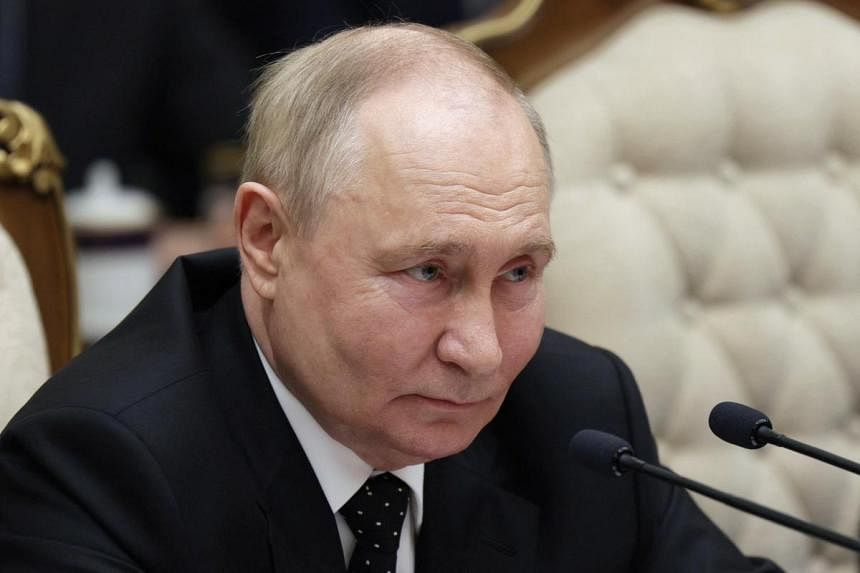
Mr Vladimir Putin is expected to arrive late on June 19 in Hanoi, fresh from a visit to Pyongyang.
JUN 19, 2024
HANOI – Vietnam prepared on June 19 to roll out the red carpet for Mr Vladimir Putin in a visit seen as a publicity coup for the Russian President, who is accused of war crimes in Ukraine, while bringing benefits and risks for Hanoi’s communist leaders.
Mr Putin is expected to arrive late on June 19 in Hanoi, fresh from a visit to Pyongyang, where he embraced North Korean leader Kim Jong Un.
Although both North Korea and Russia face international isolation, Vietnam has built careful alliances with the United States and the European Union. The US has already condemned Hanoi’s hosting of the Russian leader.
That makes the Hanoi stop of Mr Putin’s tour especially important for the Russian leader, said Dr Alexander Vuving of the Hawaii-based Inouye Asia-Pacific Centre for Security Studies.
“Russia wants to send the message that it has friends everywhere in the world and that the West’s effort to isolate Russia is futile,” Dr Vuving said, adding that Hanoi has its own interests beyond the two countries’ shared communist roots.
“Russia plays a unique and critical role in Vietnam’s foreign policy,” he said, noting that Moscow has been a major arms supplier to Hanoi.
Russia was hit with US-led Western sanctions after it invaded neighbouring Ukraine in February 2022 in what Moscow calls a “special military operation”. In March 2023, the Hague-based International Criminal Court (ICC) issued an arrest warrant for Mr Putin over alleged war crimes in Ukraine, charges he denies.
Neither Vietnam nor Russia are members of the ICC.
Historical ties
Vietnam will be the third country Mr Putin has visited, after China and North Korea, since he was sworn in for a fifth term in May. He has travelled abroad little since the ICC warrant was issued.
Vietnam was gearing up for a full state welcome for Mr Putin, his first visit since 2017 and his fifth in total. Police were seen deployed on dozens of Hanoi streets from the airport to the downtown area hours ahead of his expected arrival.
The countries have historical close ties and shared communist roots. Tens of thousands of cadres studied in the former Soviet Union during the Cold War, including the current head of Vietnam’s Communist Party, Mr Nguyen Phu Trong.
“President Vladimir Putin is a person who has made many contributions to Vietnam-Russia relations. He always has good feelings and concern for Vietnam and values relationships with Vietnam’s senior leaders,” Ministry of Defence newspaper Quan Doi Nhan Dan said in an article.
Key partner the US, which upgraded diplomatic relations with Hanoi in 2023 and is Vietnam’s top trading partner, opposed Mr Putin’s visit.
“No country should give Mr Putin a platform to promote his war of aggression and otherwise allow him to normalise his atrocities,” a spokesperson for the US embassy in Hanoi said this week.
'Bamboo diplomacy'
Still, Vietnam has its reasons to risk the ire of other diplomatic partners with the visit, said Dr Ian Storey, senior fellow at the Singapore-based ISEAS – Yusof Ishak Institute.
“Hanoi wants Putin to come for several reasons,” he said. “First, to demonstrate that Vietnam pursues a balanced foreign policy that does not favour any of the major powers.”
Vietnam pursues what it calls “bamboo diplomacy”, maintaining good relations with world powers, despite those powers’ animosity towards one another.
Noting that US President Joe Biden visited Vietnam, followed by Chinese President Xi Jinping a few months later, “Putin’s visit will complete leadership visits by the ‘Big Three’”, Dr Storey said.
Russia has historically been Vietnam’s major military supplier, so announcements of any arms deals will be closely watched.
Mr Putin is also expected to announce agreements in sectors such as trade, investment, technology and education, two officials told Reuters this week, although that was subject to change.
Early on June 19, Vietnam announced it wants Russian state oil firm Zarubezhneft to invest in green energy in the country. REUTERS
No comments:
Post a Comment